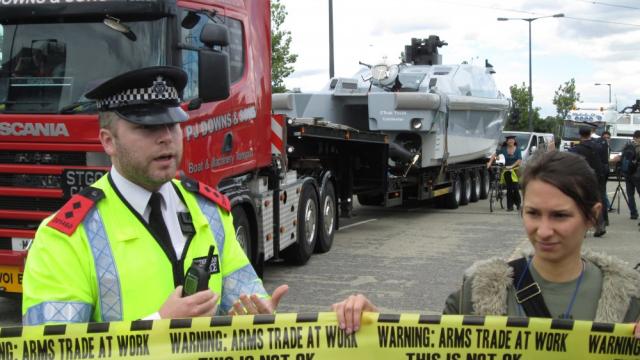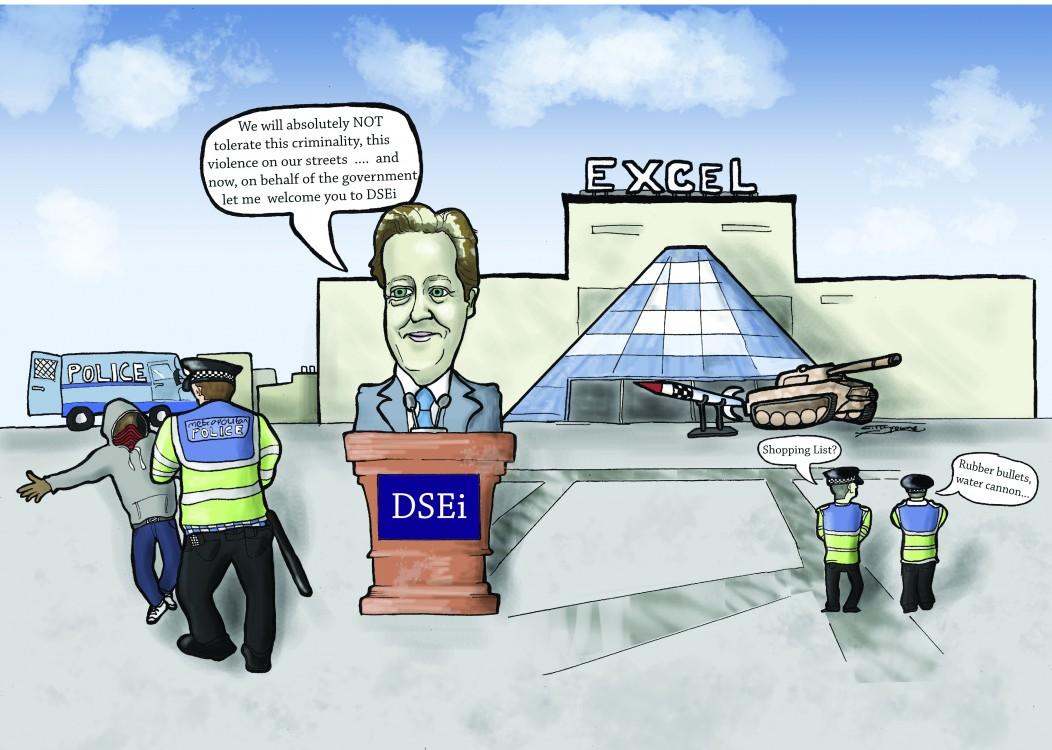
The U.K. government this week is inviting tyrants and human rights abusers to buy weapons and torture equipment – again.
London’s massive ExCel Centre is hosting the biennial DSEi arms and security event, running Monday, Sept. 7 through Saturday, Sept. 12. To many, Britain's sponsorship of the biggest arms fair in the world exemplifies the county's quiet promotion of death and destruction beyond its borders.
Every two years at DSEi, the British government invites despotic regimes to buy weaponry. Last time around, it welcomed 14 authoritarian regimes including Saudi Arabia and Libya. Every fair for the last decade has consistently offered illegal weapons and torture equipment.
But the U.K. not only consistently neglects to sanction illegal arms sales. It also spends millions on policing to prevent direct actions from protesters disrupting the event.
Standing up against the arms industry this week at DSEi, organizers with Campaign Against the Arms Trade (CAAT), Stop the Arms Fair, Occupy supporters and other anti-war activists have launched daily actions to draw public attention to the event.
Britain and the U.S., in the words of President Obama, retain a special relationship that “works together on behalf of global peace, security and prosperity.”
The impacts of the illegal Iraq war alone make this claims sound perverse. Britain’s perpetual state of war over the past 100 years further destroys this narrative.
In-"security," civilian deaths, and arming our enemies
The U.S. and U.K. represent two of the five members on the UN Security Council. But many questions whether the word "security" makes any sense, since the council's five permanent members (including Russia, France and China) sell nearly three-quarters of the world’s weapons. For example, the Security Council members are currently stoking an arms race in the Middle East, making the region far less secure.
The war business is rife with Orwellian misconceptions, including branding DSEi as a defense-security event. After all, thousands of people will die, be tortured and face repression at the hands of the tools bought and sold at DSEi. According to statistics, war kills one person every minute, and 90% of those deaths are civilians. Proportionally, this means weapons supplied by the big arms-producing nations will kill a person every 83 seconds.
A less discussed, but equally senseless aspect of the U.S.-U.K. led arms industry is the fact that the weapons countries produce and sell are increasingly likely be used against their own forces. The U.S. and U.K. have long histories of arming the enemies of their enemies, only to fight those forces latter. (For example, arming the Mujahedeen in Afghanistan, which later became Al Qaeda, and arming Saddam Hussein in the 1980s, only to fight him twice afterwards.)
During the NATO-led invasion of Libya in 2011, coalition forces would have fought against U.K. arms sold to Colonel Gaddafi’s regime. Meanwhile, as the U.S.-U.K. military establishment is sabre-rattling about invading Syria and overthrowing Assad, it fails to mention that the brutal regime’s main arms dealer, Rostec, was invited to DSEi in 2013.
For the profit-driven war machine and the 1%, arming one's enemies makes good business sense – and DSEi reflects Britain’s long history of arming repressive regimes. For instance, Margret Thatcher sold weapons to Pinochet’s Chile and Suharto’s Indonesia, while Tony Blair continued Britain’s ongoing arms sales to the Saudis.
Today, pushing arms abroad has continued as a high priority activity for Prime Minister David Cameron, who jets off on frequent tours to flog weapons and make oil deals, often in the Middle East.
This U.K. fervor to sell ever more weapons also fits the country's austerity mind-set of profits at whatever cost. Like privatization, corporate deregulation and corporate welfare, the war business is a lucrative one worth $1.8 trillion globally. War also plays a pivotal role for the fossil fuel industry, as research shows that more than half the wars fought since 1973 were done so for oil. After the Iraq invasion of 2003, the corporate-political architects in DC admitted they went in for oil, and current U.S. military plans suggest oil will continue to motivate future wars.
Understanding the military-industrial complex means attempting to untangle the connections between the military, government and arms industry – all of which have vested interests in promoting wars for economic gain. The revolving door between the war business and government spins just as fast with big banks and big oil. As just one example, corporate pro-war lobby groups like the Henry Jackson Society are heavily represented in governments on both sides of the Atlantic.
Perhaps the most startling example of the way the 1% profit from war relates to the recent rise of ISIS. On the one hand, ISIS’s brutality is being showcased at DSEi as a means of marketing weapons used to fight them. Britain is a key customer at DSEi, and Cameron has suggested that buying drones to tackle ISIS is a top priority for U.K. military spending.
The U.S.-U.K. alliance is now bombing the caliphate. But these same allies also deserve responsibility for creating it. In Iraq, ISIS emerged from the ashes of the disastrous U.S.- and U.K.- led war. In Syria, ISIS was armed in its infancy by Western states eager to help rebels fight against Assad.
Follow the next installment in this series, when we turn our attention to the ways Britain's government promotes wars while ignoring the refugees who emerge from them.

3 WAYS TO SHOW YOUR SUPPORT
- Log in to post comments















